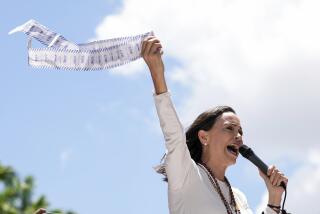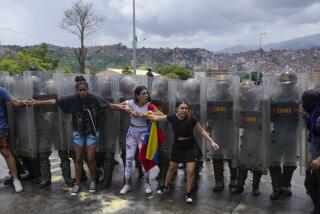Observers Applaud Nigerian Presidential Election as Success
- Share via
UKE, Nigeria — Militia groups threatened to disrupt a nationwide election here Saturday. And opposition parties felt obliged to warn the ruling party of President Olusegun Obasanjo against rigging the vote.
But despite the specter of violence and fears of electoral fraud, tens of millions of Nigerians turned out for this West African nation’s first civilian-run balloting for president in 20 years. Although there were reports that six people were shot to death by soldiers in the oil-producing Niger Delta, accounts from across the country -- which is roughly twice the size of California -- suggested that the voting at about 120,000 polling places was largely peaceful.
It remains to be seen whether the vote was devoid of fraud -- and whether the losing candidates will accept the results. That probably will become clear Monday, when most of the ballots should be counted.
By late Saturday, however, many international observers already were chalking up the election as a victory for Nigerian democracy.
“This is democracy in progress, a thing that’s moving along,” said Derrick Marco, the head of a group of South Africans monitoring the voting.
“Nigeria’s Date With Destiny,” screamed a front-page editorial in the newspaper This Day, which noted that the last civilian-run election, in 1983, was followed a few months later by a military takeover.
“Now all hands must be on deck to make sure that this sad history must not repeat itself,” the newspaper said. “We all have a stake in ensuring that democracy takes root and that Nigeria does not relapse to the odious past.”
Nigerians’ latest experiment with democracy began four years ago, when Obasanjo, a former military head of state, won the presidency in a poll supervised by the military. His election ended 15 years of military rule.
There was widespread agreement that Saturday’s election, which also chose governors for Nigeria’s 36 states, was more effectively managed than voting a week earlier to select new national legislators. Then, ballots were delivered late to polling places or not at all, ballot boxes went missing, and chaos reigned in many constituencies.
On Saturday, the Independent National Electoral Commission reported that it had honored its pledge to do better. In some places, voters began casting their ballots at 7:30 a.m., half an hour before the polls were scheduled to open.
In many states, Obasanjo, a southern Christian, faced a tough challenge from retired Gen. Muhammadu Buhari, also a former military head of state, who commands widespread support in the nation’s mainly Muslim north. Buhari is a staunch defender of Sharia, or Islamic law, which has been adopted by 12 northern states.
Still, Obasanjo was widely favored to beat Buhari and 18 other challengers. His ruling People’s Democratic Party, or PDP, which made major gains in the parliamentary balloting, was expected to oust several incumbent governors from rival parties.
*
The Rewards of Victory
Analysts say candidates for office here compete so energetically mainly because the payouts can be so handsome.
“Because political power is one of the few ways to access wealth in Nigeria, politics often becomes what is referred to in Nigeria as a do-or-die affair,” Human Rights Watch said recently in a 38-page report titled “Testing Democracy: Political Violence in Nigeria.” “Individuals are so desperate to remain or get close to the center of power that they resort to ruthless methods that might be avoided if the economy and society offered other means of supporting themselves and their families.”
For the same reason, the human rights group said, many Nigerian politicians hire small armed forces, or “political thugs,” to intimidate or even eliminate opponents.
The influence of money in Nigerian politics was evident in Uke, an agricultural village about a 45-minute drive from Abuja, the federal capital. Many of Uke’s 9,000 residents are unemployed and live on maize, millet and yams grown in the fertile soil that surrounds them.
At one polling place in Uke, Comrade Abdullahi Adamu was giving handfuls of cash to young male voters who cast ballots for Buhari and his All Nigeria People’s Party.
“I’m just thanking them,” said the 35-year-old father of three. “We need a change, and they voted the right way.”
Adamu said he gave the men about $12 each, more than their monthly salaries. As he was handing over some bills, one voter grabbed the entire wad and ran, causing a small skirmish.
Rufus Adeagbo, a member of the Transition Monitoring Group, which represents a number of local nongovernmental organizations and dispatched several thousand observers across Nigeria, said People’s Party officials apparently brought bags of cash to the village Friday night, instructing party operatives to “win at all costs.”
For their part, party officials have accused the ruling party of massive fraud in the parliamentary election. The PDP has denied the charges, but some observers say that in the next two weeks, the PDP and other winners are likely to be called before election tribunals to explain some victories.
In the Abua-Odual constituency in Rivers state, for example, the PDP candidate received 139,632 of the 141,448 votes cast. That was more than 98% of the 141,999 people registered to vote there.
After last week’s vote, Buhari and other opposition candidates threatened “mass action” -- usually interpreted here as a call for large-scale, violent demonstrations -- if Saturday’s balloting turned out to be rigged.
And indeed, vote tampering seemed to be on many people’s minds. As he cast his ballot, Lagos Gov. Bola Ahmed Tinubu, who was favored to win reelection, warned people against interfering with the electoral process.
“The consequences will be great,” he said. “Rigging represents a rape on the electorate, which they will resist.”
*
‘We Need Lights’
In Uke, many voters said they were simply happy to exercise their franchise. They lined up to cast their votes under a coral tree that shaded naked children and some stray dogs.
“We need lights in Uke,” said Mary John, 18, a high school student who said she voted for Obasanjo. “He’s a good man who brought us democracy. Maybe he’ll give us lights.”
But many other voters said they supported Buhari.
“He’s been there for four years, and where is the democracy dividend?” Suleman Wazir, 38, a father of four, asked of Obasanjo. “Nigerians are poorer while the big bosses are getting richer. We need change.”
Analysts said the fact that Nigerians were waiting in long lines to vote and debating a “democracy dividend” showed that the country was making progress. But Shola Oshunkeye, a political editor with Tell, a news weekly, said it was too early to make that pronouncement.
“We still have to be imbued with the democratic culture,” Oshunkeye said. “It all depends on what happens next week. [The candidates] have to be magnanimous. But when people lose elections here, they want to pull down the roof on everybody’s head.”
More to Read
Sign up for Essential California
The most important California stories and recommendations in your inbox every morning.
You may occasionally receive promotional content from the Los Angeles Times.













